Economist Calls for Tax Rethink
The Chief Economist at the Bank of Scotland has publicly announced his intention to lobby politicians to change what he sees as unfair levels of property taxation in the UK


A senior economist has called for a complete rethink of property taxation in the UK, to reflect the changes in the market in recent years. Martin Ellis, Chief Economist at the Bank of Scotland, has announced that it is time to bring property taxation in line with house price increases in the UK because many people are paying high levels of stamp duty and inheritance tax which were unthinkable a decade ago. Figures from the Inland Revenue illustrate how things have changed: last year seven in ten of all homebuyers were liable for stamp duty, compared with just over three in ten in 1993. Mr Ellis argues that as the level at which a buyer has to pay stamp duty has not changed for 11 years wheras house prices have ballooned by as much as 145% and people who buy a relatively inexpensive house now are forced to pay excessive amounts. He is also concerned about the levels at which people who inherit property have to pay inheritance tax. Although there was a 22% increase in the inheritance tax threshold in 1997, he notes, this does not come anywhere near the 120% growth in house prices in that same time. Mr Ellis said: ?Bank of Scotland believes that housing activity is an important part of the economy, and we also think it is fair that the Government should have its fair share of tax revenue from it. ?We do believe, however, that since housing is most people?s biggest asset it is right that tax thresholds are automatically linked to house price inflation.? Need for reform is pressing, he continues, since in the UK property taxes as a percentage of total government revenue stood at 12% in 2002, well above the eurozone average of 4.9%. Mr Ellis concluded that he plans to lobby for commitments for change from all the major political parties in the run up to the General Election, in an attempt to redress the imbalance and make things fairer for homeowners as well as would-be buyers.
Sign up for the Country Life Newsletter
Exquisite houses, the beauty of Nature, and how to get the most from your life, straight to your inbox.
-
 About time: The fastest and slowest moving housing markets revealed
About time: The fastest and slowest moving housing markets revealedNew research by Zoopla has shown where it's easy to sell and where it will take quite a while to find a buyer.
By Annabel Dixon
-
 Betty is the first dog to scale all of Scotland’s hundreds of mountains and hills
Betty is the first dog to scale all of Scotland’s hundreds of mountains and hillsFewer than 100 people have ever completed Betty's ‘full house’ of Scottish summits — and she was fuelled by more than 800 hard boiled eggs.
By Annunciata Elwes